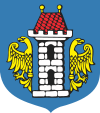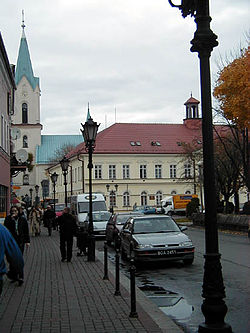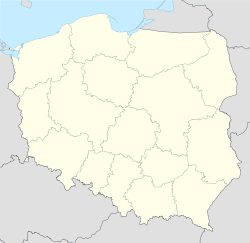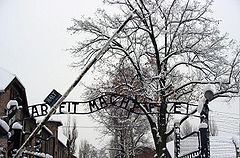- Oświęcim
-
Not to be confused with Oświęcim, Greater Poland Voivodeship.
Oświęcim Old Market Square 
Flag
Coat of armsCoordinates: 50°3′N 19°14′E / 50.05°N 19.233°ECoordinates: 50°3′N 19°14′E / 50.05°N 19.233°E Country  Poland
PolandVoivodeship Lesser Poland County Oświęcim County Gmina Oświęcim (urban gmina) Established First mentioned in 1117 Town rights 1291 Government – Mayor Janusz Chwierut Area – Total 30.3 km2 (11.7 sq mi) Elevation 230 m (755 ft) Population (2006) – Total 40,979 – Density 1,352.4/km2 (3,502.8/sq mi) Time zone CET (UTC+1) – Summer (DST) CEST (UTC+2) Postal code 32-600, 32-601, 32-602, 32-603, 32-606, 32-610 Area code(s) +48 033 Car plates KOS Website Oświęcim (English) Oświęcim (pronounced [ɔɕˈfjɛɲt͡ɕim] (
 listen)) (German: Auschwitz, Yiddish Oshpitsin אָשפּיצין, Czech: Osvětim, Slovak: Osvienčim, Russian: Освенцим) is a town in the Lesser Poland (Polish: Małopolska) province of southern Poland,[2] situated 50 kilometres (31 mi) west of Kraków, near the confluence of the rivers Vistula (Wisła) and Soła.
listen)) (German: Auschwitz, Yiddish Oshpitsin אָשפּיצין, Czech: Osvětim, Slovak: Osvienčim, Russian: Освенцим) is a town in the Lesser Poland (Polish: Małopolska) province of southern Poland,[2] situated 50 kilometres (31 mi) west of Kraków, near the confluence of the rivers Vistula (Wisła) and Soła.Contents
History
Following the Fragmentation of Poland in 1138,[citation needed] Casimir II the Just attached the town to the Duchy of Opole in 1179 for his younger brother Mieszko I Tanglefoot. The town was destroyed in 1241 during the Tatar invasions. Around 1272 the newly rebuilt town created a municipal charter modeled on those of Lwówek Śląski (a Polish variation of the Magdeburg Law). Throughout much of history, Germans and Poles lived together peacefully in the town. From 1315 the town was the capital of independent duchy. In 1327, John I, Duke of Oświęcim joined with a western part of Galicia (Central Europe), the Duchy of Oświęcim, and Duchy of Zator a vassal state attached to the Kingdom of Bohemia. In the 14th century the population declined.[specify] The portion of ethnic Germans in the town shrank and in 1457 the Polish king Casimir IV bought the rights to the town, which was attached afterwards to the Cracow Voivodeship. Jews, invited by Polish kings to settle in the region, had already become the majority of the population[verification needed] in the 15th century. The town also became one of the centres of Protestant culture in Poland.[3]
The town was destroyed again during the 1655 Swedish Deluge. In 1772 it was annexed by Austria in the First Partition of Poland.
After the 1815 Congress of Vienna, the town was close to the borders of both Russian-controlled Congress Poland, and the Kingdom of Prussia. In the 1866 war between Austria and the Prussian-led North German Confederation, a cavalry skirmish was fought at the town,[specify] in which an Austrian force defeated a Prussian incursion.[4][5]
After World War I, the city became part of the Second Polish Republic. On the eve of World War II there were about 8,000 Jews in the city, over half the population.[6]
World War II and post-war
For the nearby concentration and extermination camps, the museum, and the forced labor camp for the IG Farben plant, see Auschwitz, Auschwitz-Birkenau State Museum, and Monowitz.In October 1939, Nazi Germany immediately annexed the area to Germany in the Gau of Upper Silesia,[citation needed] which became part of the "second Ruhr" by 1944.[7] In 1940, Nazi Germany used forced labor to build a new subdivision to house Auschwitz guards and staff.
After the territorial changes of Poland immediately after World War II, new housing complexes in the town were developed with large buildings of rectangular and concrete constructions. The chemical industry became the main employer of the town and in later years, a service industry and trade were added. Tourism to the concentration camp sites is an important source of revenue for the town's businesses.
In the mid-1990s following perestroika, employment at the chemical works (renamed Dwory S.A.) reduced from ~10,000 in the communist era to only 1,500 people.
Historical affiliations
- Province of Kraków c. 1138-1179
- Duchy of Opole 1179
- Duchy of Oświęcim 1315-1327
- Kingdom of Bohemia 1327
- Dukes of Te and Grossglogau[when?]
- Kraków Voivodeship 1457
- Kingdom of Galicia and Lodomeria 1772-1918
- Second Polish Republic 1918-1939
- Nazi Germany (Bielitz district)[8]
- 1939-1945
- 1945
- People's Republic of Poland 1952
- Bielsko-Biała Voivodeship 1975-1998
- Lesser Poland Voivodeship 1999 (year wikilinks are to a corresponding article)
Geography
Oświęcim lies on the intersection of national road 44 with road 933 and is at the northern extremity of road 948. Oświęcim's old town is located east of the Soła, with the Main Market Square (Rynek Główny) at its centre. The railway station is across the river, in the north west of the town, with the main museum in the west of the town. The Auschwitz-Birkenau State Museum is in the village of Brzezinka, to the west of the railway station. The chemical works are located east of the town.
Transport
The main bus station of the town is in ulica Chemików in the east of town and local bus services are operated by PKS Oświęcim. The PKP railway services from ulica Powstańców Śląskich are available to Kraków, Katowice and Czechowice-Dziedzice and internationally to Vienna and Prague.
Sport
The ice hockey team of TH Unia Oświęcim was crowned Polish champions 8 times as of 2010.[9]
Notable people
See also: Category:People from OświęcimMany Polish figure skaters are from the town, including Sabina Wojtala and the pair Dorota Siudek and Mariusz Siudek. Other notable people from the town include Aaron Miller (cantor) (rebbe & father of chazzan Benzion Miller) and Victor Zarnowitz (American economist). Members of Parliament (Sejm) elected from this constituency include Janusz Chwierut (PO), Paweł Graś (PO), Paweł Kowal (PiS), Marek Jerzy Łatas (PiS), Leszek Murzyn (LPR), Marek Polak (PiS), and Stanisław Rydzoń (SLD-UP).
International relations
Twin towns — sister cities
Oświęcim is twinned with:
Gallery
References
- Lange, Irena (1967) (in Polish). Oświęcim. Zarząd Główny Związku Bojowników o Wolność i Demokrację. http://books.google.com/books?id=hlUOGwAACAAJ. Retrieved 9 April 2010.
- ^ "Auschwitz Birkenau: German Nazi Concentration and Extermination Camp (1940-1945)". http://whc.unesco.org/en/list/31. Retrieved 2009-12-29. "Oświęcim County, Lesser Poland (Małopolska) Voivodship (formerly Bielsko-Biala)"
- ^ This article incorporates information from this version of the equivalent article on the Polish Wikipedia
- ^ Elzbieta Skalinska-Dindorf, historian, State Archive in Oświęcim, The History of the City of Oświęcim. CHRONICLE
- ^ Prussian General Staff, The Campaign of 1866 in Germany, 1907, page 97.
- ^ Balck, William, trans by Walter KruegerTactics, Volume II: Cavalry, Field, and Heavy Artilliery in Field Warfare., ; U.S. Cavalry association, 1914,page 5
- ^ Oshpitzin, Sefer (translator, from Hebrew). "ספר אושפיצין (English: Oświęcim Memorial Book)". Israel: Oświęcim Descendant and Survivor Association. http://www.jewishgen.org/yizkor/oswiecim1/oswiecim.html.
- ^ The Coming Phase. Flight Magazine. September 23, 1943. http://www.flightglobal.com/pdfarchive/view/1943/1943%20-%202314.html. Retrieved 2010-10-20. "This vast industrial area, which has been called by the Germans the "second Ruhr" (and which includes the Southern regions of Germany, the plateau of Bohemia, and Polish Silesia, hitherto more or less impervious to bomber attack), has been stripped of its geographic defenses."[verification needed]
- ^ This article incorporates information from this version of the equivalent article on the German Wikipedia
- ^ Historia klubu (Polish)
External links
 Media related to Oświęcim at Wikimedia Commons
Media related to Oświęcim at Wikimedia CommonsSeat (not part of the gmina) Oświęcim
Villages Babice • Broszkowice • Brzezinka • Dwory II • Grojec • Harmęże • Łazy • Osada Stawy Grojeckie • Pławy • Poręba Wielka • Rajsko • Stawy Monowskie • Włosienica • ZaborzeSeat Oświęcim (urban gmina)
Urban-rural gminas Rural gminas Categories:- Oświęcim
- Oświęcim County
- Cities and towns in Lesser Poland Voivodeship
- Province of Kraków c. 1138-1179
Wikimedia Foundation. 2010.




